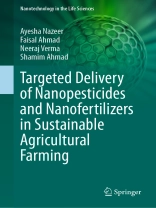Nanofertilizers and nanopesticides increase crop efficiency because of a several-fold increase in the surface-to-volume ratio of nano-forms of nutrients and their suitability to foliar application. The potential agricultural benefits of these nanomaterials, their modes of action, and the fate of nanomaterials in the soil are all discussed.
This book uses a multidisciplinary approach and highlights the expertise of the authors in the fields of materials science, nanotechnology, nanobiosensors, and agricultural research. It describes the details of nanoscale synthesis of materials for targeted delivery; in vitro, in vivo, and field trials experimentation; how to use digital technology for specific solutions including Big Data to create predictive mathematical modelling; along with the core knowledge of plant systems and their biosphere to improve crop yields. Also, the book discusses future perspectives and challenges of nanomaterials in agricultural applications.
In summary, this book discusses agricultural nanobiotechnology with its main emphasis on understanding the interactions of nanoscale materials of pesticides and fertilizers. It also covers their application to improve the quality and increase crop yield with a minimum use of the active ingredients attached to the nanocarriers.
Table of Content
Preface.-
Foreword.-
Acknowledgment.-
1. Nanoscience, Nanotechnology and Engineered Nanomaterials – An Introduction.- 2.Nanomaterials and Plant Biomolecules – Basics of Interactions.- 3.Nanomaterials and Phytonanobiotechnology.- 4. CNMs and CDs in Plant Growth
5.Nanofertilizers in Agriculture.- 6.Pesticides and Crop Protection.- 7.Nanotechnology and Crop Management.- 8. Targeted Delivery of Nanopesticides.- 9. Nanopesticides in Agriculture: Some Examples.- 10. Revelance of Nanopesticides and Nanofertilizers in Sustainable Agriculture.- 11. Nano-enabled Agrotechnology: Current Status.- 12. Nano-agro-biotechnology Prospects.- 13. Future Aspects.- Index.
About the author
Ayesha Nazeer is a scientist with 20+ years of experience in the biopharmaceutical industry. With a background in Cell Biology, she has worked on the validation of novel drug targets in the drug discovery process. She started her career at Medarex, Inc., USA, which was later acquired by Bristol-Myers Squibb. After spending 17 years there in the Preclinical Pharmacology Group, she is currently working at Amunix Pharmaceuticals Inc., a startup based in South San Francisco. At Amunix, her work focuses on determining the safety profile of oncology targets. Ayesha has a Master’s degree in Biotechnology. She is settled in San Jose, California. Having more than 18 years of experience in turning marketing ideas into reality, Faisal Ahmad has been responsible for steering the growth of Iris in Delhi by setting up its digital offering for clients ‘GLOCALLY’. His expertise in developing solutions in the area of Digital Marketing has been quite successful with several industry brands like Airtel Africa, General Motors, MINI Cooper, Nokia, and Samsung, to name a few, in addition to having much wider coverage of valuable experience across industries like Telecom, IT, Automobile, Hospitality, BFSI, and Retail. Holding a Master of Engineering in Computer Science Degree from BITS, Pilani spent the first 5 years of his experience as a Software Engineer before moving into managing larger digital mandates involving Marketing Technology aspects of the business. His current focus areas include ‘Design Thinking for Integrated Marketing Offerings and developing business solutions based on Internet of Things (Io T) concepts. Combining the recent developments in Io T with Social Io T Networks already in vogue, one can find out the options for solutions to avoid the emerging security issues. In this context, the networking aspects of the objects with low-cost Printing Technology for Sensors and Devices are also being studied by him and his research team from an industrial angle.
Dr. Neeraj Verma, Ph.D. (Botany) with specialization in Botany (Plant Pathology), has been working as Professor, Department of Agriculture Science, Faculty of Agriculture Science and Technology, AKS University, Satna, India, since 2012. Earlier, he was Assistant Specialist (Plant Virology), University of California Riverside, Riverside, CA, USA. He has research and teaching experience spanning more than 20 years. The research areas include molecular plant virology, biotechnology, and nanobiotechnology. He has published more than 45 International and National research papers and book chapters and has published three books. He has worked on various research projects funded by government agencies. He has attended many national and International conferences. He is an editor and reviewer for several professional journals.
S. Ahmad started his R&D career at the Council of Scientific and Industrial Research (CSIR)-Central Electronics Engineering Research Institute (CEERI), Pilani, Rajasthan, India, and served there from 1972 to 2005. Contributed significantly not only to electronics for strategic applications but also actively participated in setting up R&D facilities and forming research groups to work in semiconductor physics and device applications before getting superannuated as Director. Later, he joined Hamdard University, New Delhi, as Vice Chancellor and succeeded in infusing R&D culture into the University. The University of Malaysia, Perlis, Malaysia, invited him as a visiting professor in the Institute of Nanoelectronics Engineering. After returning from Malaysia, joined the Confederation of Indian Industry (CII) as Chief Nanotechnology Adviser to establish a Centre of Excellence in Green Nanotechnology in Ahmedabad, Gujrat, India, especially working on green nanotechnology processes. Thereafter, he joined the JC Bose University of Science and Technology YMCA, Faridabad, as Visiting Professor, Department of Electronics Engineering, and established a modular clean room facility at a reduced cost for academic institutions.












